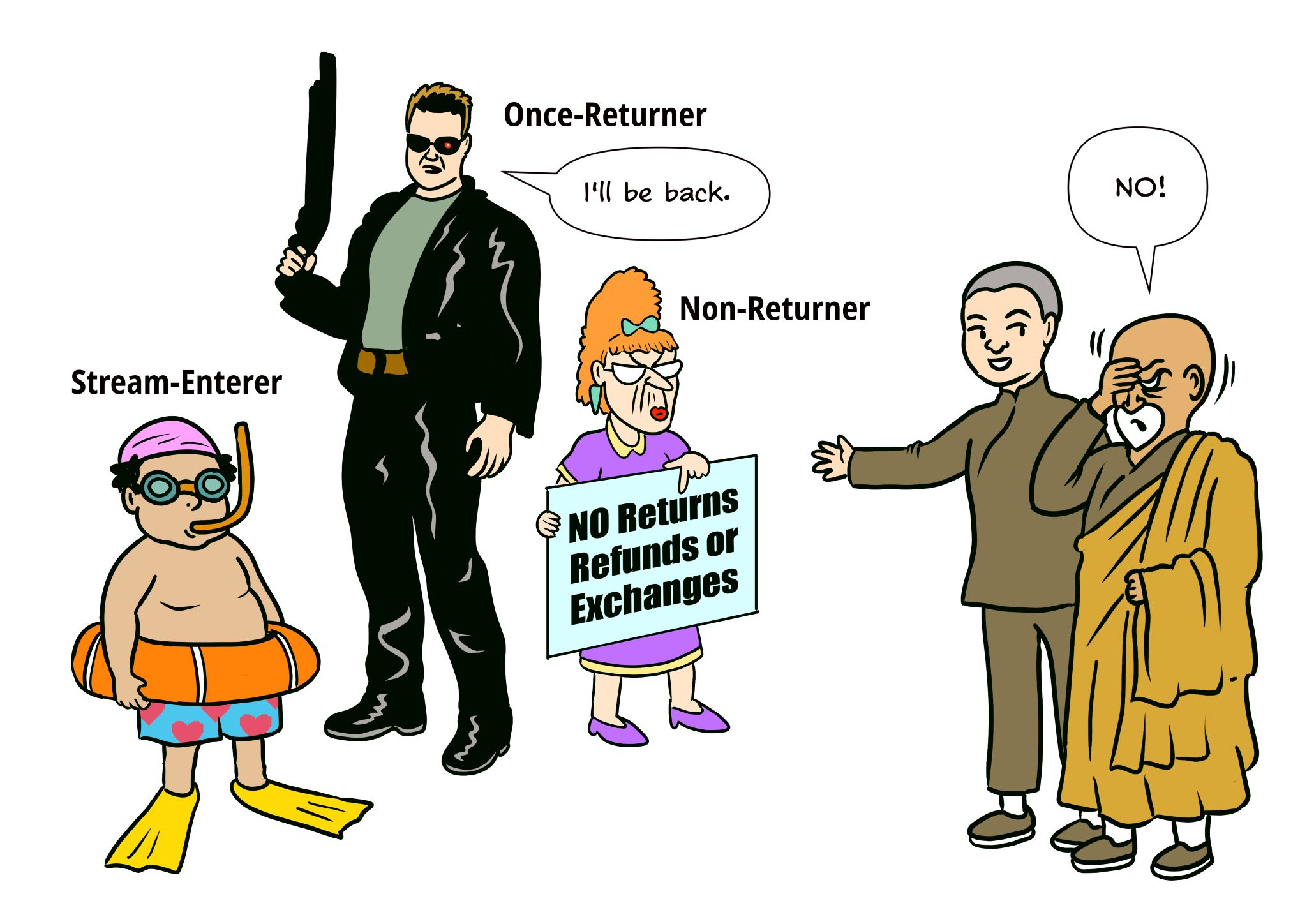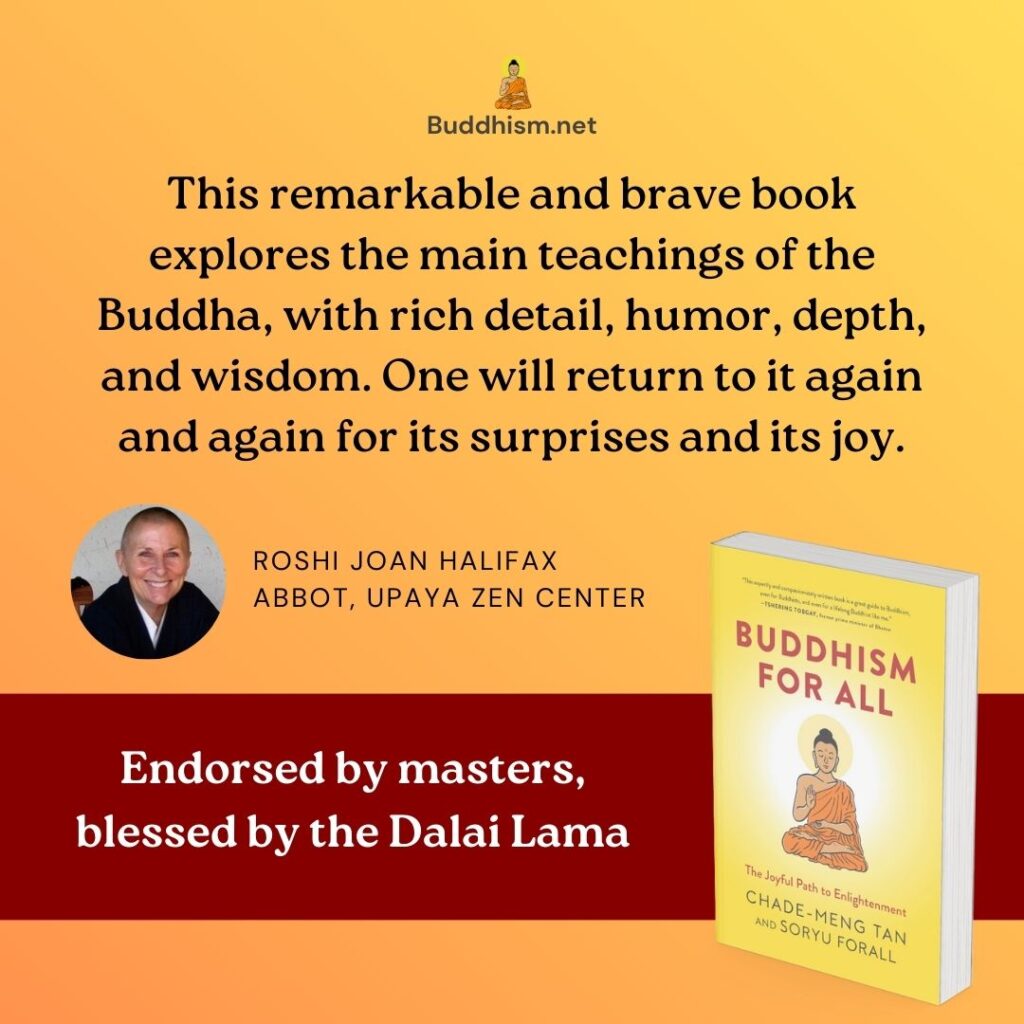
The prospect of working towards full enlightenment can be very daunting. Fortunately, there is good news, and there is even better news. The good news is that the path towards full enlightenment can be broken down into four stages, and reaching stage one is far less daunting than reaching full enlightenment itself. The even better news is that according to the Buddha, once you reach stage one, you are guaranteed to reach full enlightenment in the future, or your money back. Hence, for mere mortals like myself, the seemingly unsolvable problem of reaching full enlightenment is greatly simplified to the still very challenging but actually solvable problem of reaching stage one.
According to the Buddha, there are ten fetters that hold us back from full enlightenment.[1] When these ten fetters are abandoned, full enlightenment results. These ten fetters are abandoned in four stages, and they are known as the four stages of enlightenment.
In the first stage, one abandons three fetters: identity view, doubt, and the distorted grasp of rules and vows.[2] (We will discuss in some depth in a later article.) One who successfully abandons these three fetters arrives at the first stage of enlightenment and is known a stream-enterer (sotāpanna). Upon reaching this stage, one is guaranteed to arrive at full enlightenment in no more than seven additional lifetimes. In addition, if a stream-enterer is reborn, it will no longer be in a “state of woe”. In other words, a stream-enterer who is reborn does so either as a human or a god, not as an animal or a hell-being.
In the second stage, one greatly reduces, but does not totally abandon two fetters: sensual desire, and ill will. One who does that arrives at the second stage of enlightenment and is known as a once-returner (sakadāgāmī). A once-returner will return to the “realm of the senses”, which means being a human or a god, at most once before arriving at full enlightenment.
In the third stage, one totally abandons the two fetters of sensual desire and ill will. Yes, sensual desire and ill will are so hard to abandon it takes two entire stages of enlightenment just to accomplish that. One who abandons sensual desire and ill will arrives at the third stage of enlightenment and is known as a non-returner (anāgāmi). A non-returner will no longer return to the “realm of senses” as a human or a god, but if a non-returner takes birth, it will be in one of the “Pure Abodes”[3] and the non-returner will arrive at full enlightenment from there.
Once, Ajahn Brahm and I both spoke on the first day of a multi-day conference on Buddhism. After we got off stage Ajahn Brahm told me that due to his travel schedule, he could only come back one more day, and as usual, he made a joke about it, “I’m only coming back once, I’m a once-returner.” And I said, “I’m not coming back at all, I’m a non-returner.”
The five fetters listed above are known as the five lower fetters. In the fourth and final stage, one abandons the remaining five, known as the five higher fetters. These five are: lust for form, lust for the formless, conceit, restlessness, and ignorance. One who abandons all ten fetters arrives at full enlightenment (yoohoo!) and is known as an arahant. Where does one go from here? There is nowhere to go. You beat the game. No more suffering, ever! In the ancient texts, one who arrives at arahantship declares that from that moment on, “what had to be done has been done.”[4]
Table: The Four Stages of Enlightenment
| Stage | Fetter Abandoned / Reduced |
|---|---|
| Stream-enterer | Abandoned (1) identity view, (2) doubt, and (3) distorted grasp of rules and vows. |
| Once-returner | Greatly reduced (4) sensual desire, and (5) ill-will. |
| Non-returner | Abandoned (4) sensual desire, and (5) ill-will. |
| Arahant (Full enlightenment) | Abandoned (6) lust for form, (7) lust for the formless, (8) conceit, (9) restlessness, and (10) ignorance. |
Activities
References
[1] Aṅguttara Nikāya 10.13.
[2] Bhikkhu Bodhi’s translation.
[3] In Pali: suddhāvāsa.
[4] Majjhima Nikāya 11, and other places.
Featured image by Colin Goh.


